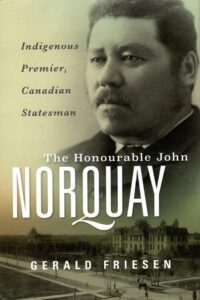Book review: The Honourable John Norquay: Indigenous Premier, Canadian Statesman
 Reviewed by Karl Hele
Reviewed by Karl Hele
Gerald Friesen’s The Honourable John Norquay: Indigenous Premier, Canadian Statesman is a well researched exploration of Norquay’s contribution to Manitoba and the Canadian federation. As all biographies do, the narrative begins with Norquay’s birth in 1841 and concludes with his unexpected death in 1889. In between, Friesen documents Norquay’s efforts to secure equality amongst provinces, eliminate federal control of western lands, contest the CPR’s monopoly, establish provincially-chartered railroads, promote settlement and business, as well as place Manitoba on a secure financial footing. A lot of the book deals with federal-provincial politics, leaving the reader often wondering about the local and Indigenous understandings. Additionally, the biography deals with the challenges faced by Norquay while navigating provincial politics as the ‘old Red River Settlers’ (read French and English Métis) were displaced physically and politically by newcomers, many of whom appear to have been racist, sectarian, and prejudiced, from Quebec and mainly Ontario. Albeit, Norquay is presented as offering resistance to Sir John A. Macdonald and other Easterner’s (Ontarians and Québécois) treatment of the west as a mere colony of the east ripe for exploitation. Nevertheless, in Friesen’s biography, Norquay comes across as an individual set on establishing Manitoba’s place within confederation and the British Empire. Simply, The Honourable John Norquay is a standard Canadian political biography, both in style and content, of an important male leader in early confederation, whose origins happen to emanate from the English-Métis community.
Norquay does historically standout as a mixed-blood individual who spent nine years as Premier of a Canadian province in formation during a period of increasing racism, colonialism, and nationalist sentiment based on all things Protestant, British, and Imperial. It can be gleaned within the chapters that Norquay, as Premier with Indigenous ancestry, experienced racism from his political peers both in Manitoba (immigrants largely from Ontario, the British Isles, and Quebec) and Ottawa (i.e., Sir John A. Macdonald). Yet, the racism or prejudice is often glossed over in favour of the narrative of a great man standing strong with a vision for his province.
Also absent is a proper discussion of Norquay’s seemingly silence on the stripping of Cree, Saulteaux, and Dakota voting rights by the Manitoba legislature or the redistribution of electoral districts that progressively eliminated effective French-Métis voices in the legislature. While Norquay appears to have failed to resist and stand up to prejudice, sectarianism, and racism, Friesen notes that the records for these moments in Norquay’s story do not exist. Hence, unless new records are uncovered, we will never know truly of Norquay’s opinions or actions; however, Friesen seemingly downplays Norquay’s business connections to the Saskatchewan Coal Company’s take over of a portion of a Blackfoot reserve, again, citing a lack of documentation concerning Norquay. Instead, Friesen chooses to emphasize Norquay’s sense of justice and fair play in ensuring French (but not necessarily Métis) inclusion in his cabinets all the while the Premier advocated for the acceptance of the new order moving west – private property, as well as Canadian and British connections, institutions, and laws. Thus, Norquay’s dealings with, understandings, and interactions with First Nations is never firmly established or explored beyond oblique references and instances that seemingly lead nowhere. I found the lack of analysis and discussion, even with the limited records, about Norquay’s overall perceptions of First Nations and Métis entirely disappointing.
Overall, Friesen’s standard Canadian political biography was an interesting, pedantic, in-depth dive into Norquay’s efforts to establish Manitoba’s place in confederation. Many of his policies and actions (or inactions) shaped the province’s destiny. He happened to be English-Métis who promoted connections and essentially acceptance, nay I say assimilation, to the Canadian and larger English world, unlike French-Métis Louis Riel who advocated and fought for a vastly different idea of Métis Nationhood within Canada. Simply, Friesen does not really answer how Norquay fits into the narrative of the Métis past; instead, he establishes the Premier as a definitive founder of Canadian federalism.
I would not recommend this work to the average reader or individuals interested generally in Indigenous history. If you are interested in political history and biography, as well as railroad debates, and the wider history of Manitoba, this is a wonderful book. Hopefully, Friesen’s work will inspire Métis and First Nations scholars to explore the complex nature of Norquay’s identity, as well as his relationships with and actions toward Indigenous peoples.
Gerald Friesen, The Honourable John Norquay: Indigenous Premier, Canadian Statesman. Winnipeg: University of Manitoba Press, 2024.
ISBN: 978-1772840582


